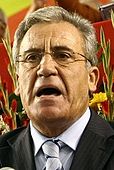Portuguese local election, 2005
|
|
|||||||||||||||||||||||||||||||||||||||||||||||||
|---|---|---|---|---|---|---|---|---|---|---|---|---|---|---|---|---|---|---|---|---|---|---|---|---|---|---|---|---|---|---|---|---|---|---|---|---|---|---|---|---|---|---|---|---|---|---|---|---|---|
|
|||||||||||||||||||||||||||||||||||||||||||||||||
|
All 308 Portuguese municipalities and 4,260 Portuguese Parishes All 2,046 local government councils |
|||||||||||||||||||||||||||||||||||||||||||||||||
|
|||||||||||||||||||||||||||||||||||||||||||||||||
| Portugal |
 This article is part of the series: |
This article is part of the series:
Politics and government of
Portugal
The Portuguese local election of 2005 took place on 9 October. The election consisted of three separate elections in the 308 Portuguese municipalities, the election for the Municipal Chambers, whose winner is elected mayor, another election for the Municipal Assembly and a last one for the lower-level Parish Assembly, whose winner is elected parish president. This last was held separately in the more than 4,000 parishes around the country.
The Socialist Party may be considered the major defeated party of this election due to a slight loss of mandates. The Socialists did, however, achieve a better percentage of the vote in relation to the election of 2001.
On the right, the Social Democratic Party stole some municipalities from the Socialists, some of them in coalition with the People's Party that was reduced to only one municipality in stand-alone candidacies, Ponte de Lima, continuing its decline in comparison, for example, with the 36 mayors achieved in 1976.
On the left, the Unitarian Democratic Coalition, led by the Communist Party, regained some of its former influence, taking 4 municipalities and several parishes from the Socialists in the districts of Beja, Évora and Setúbal and Leiria achieving a total of 32 mayors, and winning, for the first time, the election in Peniche. The Leftwing Bloc kept the presidency of its single municipality, Salvaterra de Magos.
...
Wikipedia



